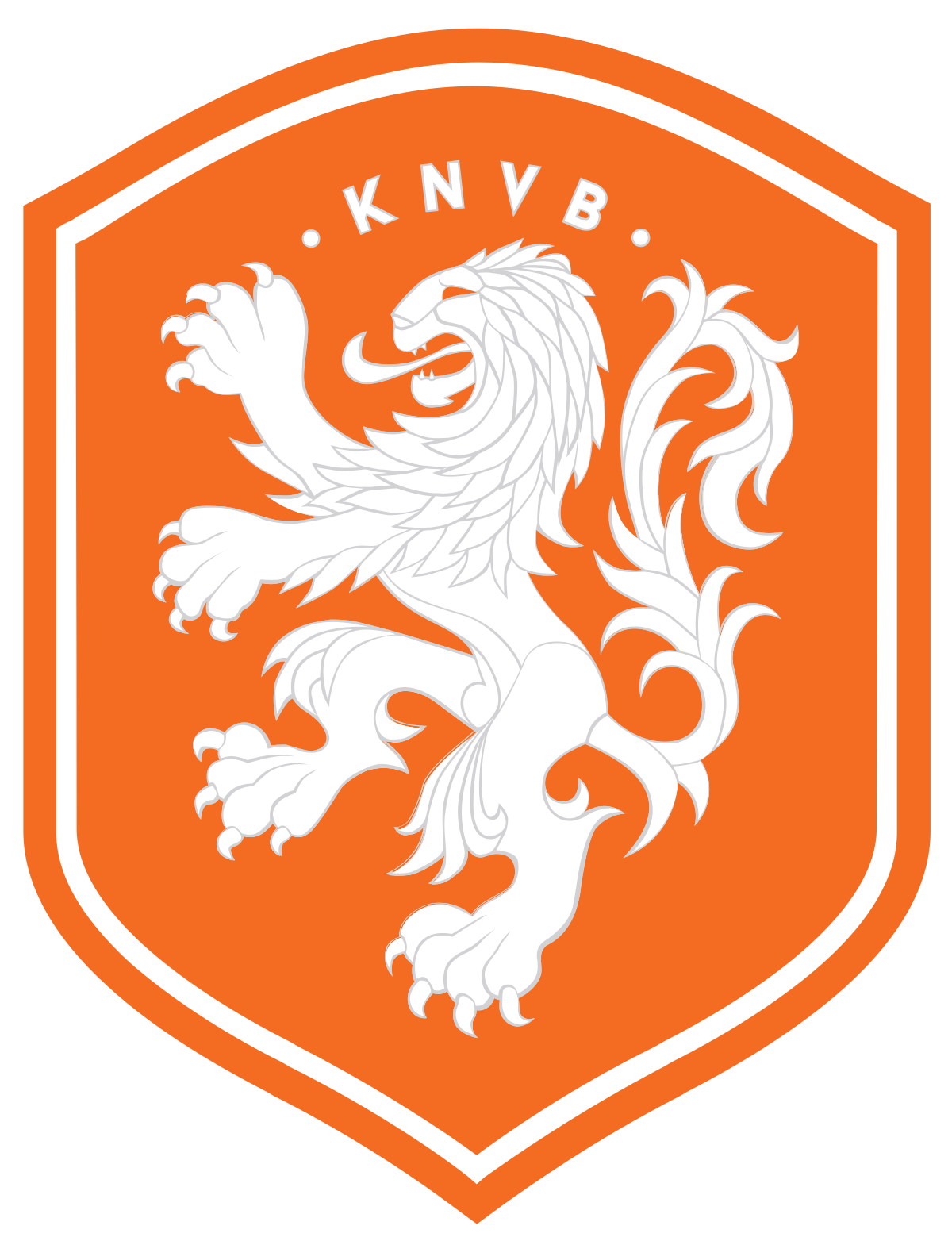
Netherlands (Oranje)
Runners Up: 3 (1974, 1978, 2010)
Third Place: 1 (2014)
Fourth Place 1 (1998)
Quarter Finalists: 1 (1994)
Round of 16: 4 (1934, 1938, 1990, 2006)
Current FIFA World Ranking: 8
Virgil van Dijk
Read More
Frenkie de Jong
Read More
Memphis Depay
Read More
Louis van Gaal
Read More
Group A Schedule
Game 1 – Monday 21st November 2022

Senegal
19:00 Qatar Time/16:00 GMT
Al Thumama Stadium, Doha
Game 2 – Friday 25th November 2022

Ecuador
19:00 Qatar Time/16:00 GMT
Khalifa International Stadium, Al Rayyan
Game 3 – Tuesday 29th November 2022

Qatar
18:00 Qatar Time/39:00 GMT
Al Bayt Stadium, Al Khor
Notable Honours
The Netherlands’ greatest ever achievement came in 1988 when they won the European Championship. They have been runners-up in the World Cup three times (1974, 1978, 2010). They also attained the Bronze Medal at the 1908, 1912 and 1920 Summer Olympics, and were runners-up in the inaugural Nations League in 2019.
Impact and Beginnings
The history of the Dutch national football team is inexorably intertwined with the development of Total Football and the famous 1974 and 1978 World Cup campaigns. Despite losing both finals, those teams are more fondly remembered than both the victorious West Germany team of 1974 and the triumphant Argentina team of 1978 because of the breathtaking nature of the football produced by this tactical revolution. Fluid, positionless football had been attempted and brought success for various teams until the Dutch variant. However, it was firstly Feyenoord and Ajax, and then the national team, who arguably perfected the approach. The impact of this style of play on world football cannot be underestimated, as it has given rise to many systems and concepts used at the highest levels of modern football. These include Tiki-Taka and Juego de Posicion. The Dutch therefore possess a legacy as pioneers in the game.
However, before the late 1960s, it can be said that the Dutch national team was rather anonymous. Whilst they participated in the 1934 and 1938 World Cups, they failed to win either of their ties, losing to Switzerland in 1934 and Czechoslovakia in 1938. Their next appearance at a major international tournament would not come until 1974, following a string of failures, including a 1964 European Nations’ Cup qualifying exit to Luxembourg 3-2 on aggregate.
Total Football
A massive reversal in fortunes was on the way, thanks to the continental success of Dutch clubs and the pioneering influence of Total Football. Spearheaded by legendary player Johan Cruyff and the consummate tactician Rinus Michels, the Netherlands took the footballing world by storm. In 1974 they beat both reigning champions Brazil and Argentina in the group stage en route to the final without conceding a goal. Carlos Alberto, the Brazilian captain who lifted the trophy in 1970, was to remark ‘The only team I’ve seen that did things differently was Holland at the 1974 World Cup in West Germany. Since then, everything looks more or less the same to me…. Their ‘carousel’ style of play was amazing to watch and marvellous for the game.’
In 1978, the Netherlands were without several key players, including the talismanic Cruyff, but with their style of play firmly entrenched they were still successful in reaching the final. There, they fell to two extra time goals by hosts Argentina, with Rob Rensenbrink hitting the post for the Dutch in the last minute of normal time.
Decline, Then Resurgence in the Late Eighties
Following the successful 1970s side’s dismantling, a group exit in Euro ’80 ensued, followed by a failure to qualify for three successive international tournaments in 1982, 1984 and 1986. Euro ’88 saw legendary coach Rinus Michels return to the fold to work with an emerging core of talented players, including Marco van Basten, Ruud Gullit, Frank Rijkaard, and Ronald Koeman. The tournament was marked by a late winner from van Basten to defeat rivals West Germany in the semi-finals 2-1, and also a wonder volley by the same player to defeat the Soviet Union in the final to win their first major tournament.
A disappointing Italia ’90 followed, with van Basten man-marked throughout the tournament and Gullit not fully fit. An exit in the last sixteen to eventual champions West Germany was to come. An upturn in fortunes followed in 1994, with van Basten’s successor Dennis Bergkamp catching the eye, scoring three goals in the lead-up to a quarter-final clash against Brazil. Indeed, the match against the South American side was arguably the game of the tournament. Although the Dutch lost 3-2, pride in the national team had largely been restored.
In 1995, Ajax won the UEFA Champions League under coach Louis Van Gaal, with the team featuring such mercurial young talents as Michael Reiziger, Edgar Davids, Clarence Seedorf, and Patrick Kluivert. This young foundation was allied to older players at the peak of their powers, such as Edwin van der Sar, the de Boer twins, Arthur Numan, Jaap Stam, Marc Overmars, and the magnificent Bergkamp. As a result, the Netherlands impressed in France ’98. The team progressed to the semi-final courtesy of a typical Bergkamp wonder goal in the last minute versus Argentina in the last eight, only to suffer defeat to another strong Brazilian side on penalties. The Netherlands had been beaten but had proved themselves an excellent side.
2002-2010: Hard Times, Then Bridesmaids Again
Following a highly publicised failure to qualify in 2002, the Netherlands returned in 2006, falling to a 1-0 defeat against Portugal. The contest was dubbed the ‘Battle of Nuremberg’, owing to 16 yellow cards plus two red cards apiece. However, in South Africa in 2010, Oranje reached their first World Cup final in 32 years, in which they faced pre-tournament favourites Spain. In a close game characterised by an aggressive yet disciplined approach from the Dutch, Spain eventually broke through in extra time courtesy of Barcelona’s Andres Iniesta. The Netherlands were bitterly disappointed but had gone further than expected.
2014-2020: Mixed Fortunes and Recent Improvement
In 2014, a largely unfancied Dutch team starring world-class players such as Wesley Sneijder, Arjen Robben, and Robin van Persie was to top the group of death, exacting revenge on reigning champions Spain 5-1 before defeating dark horse Chile and then Australia. They left it late to beat Mexico 2-1 in the round of sixteen courtesy of a controversial late penalty after an alleged Robben dive. They then made heavy work of defeating an impressive Costa Rica team, eventually progressing on penalties. The Netherlands now had the chance to reach a second successive World Cup final. Unfortunately, penalties would again decide their fate in the semi-final, but this time Argentina progressed 4-2 following 0-0 after extra time.
After a failure to qualify in 2018, the Netherlands are back in the fold for Qatar. They are ticking along nicely, being undefeated since their round of sixteen exit at Euro 2020 to the Czech Republic. Recent Nations League victories over Belgium (4-1 and 1-0) and a place in the Finals of the competition next summer have inspired confidence in a young, talented core. Consequently, they are expected to make light work of a favourable group. However, AFCON champions Senegal will pose a threat and being in the same group as the hosts is always a quirk.
Road to Qualification
UEFA Group G: 1st
Record: Played:10 W:7 D:2 L:1 F:33 A:8 GD:+25 Points:23
Date of Qualification: 16th November 2021
Following a poor start to qualification where the Netherlands accrued just four points from three games in a run which included a 4-2 defeat to Turkey and a 3-3 draw with minnows Latvia, celebrated coach Louis van Gaal was to take charge for the remainder of the campaign. The Dutch subsequently won their last six matches, including a 6-1 rout in the reverse against Turkey and revenge on Norway on the final day in Rotterdam for an earlier defeat in Oslo. This game was crucial as a Norway victory would have eliminated the Dutch. They scored 33 goals in qualifying, for an average of 3.3 goals per game, and kept six clean sheets. Their top scorer was Memphis Depay, with an impressive 12 goals. The group was of moderate difficulty, also including Montenegro and minnows Gibraltar, so not much can be gleaned for prospects in Qatar. Van Gaal will simply be relieved to have got past tricky opponents like Norway and Turkey.
Meet the Coach: Louis van Gaal (age 71)
Following an undistinguished playing career, Van Gaal’s first job as a senior coach came at the age of 40 in 1991 when he took over Ajax. His spell there, containing the aforementioned young players, was very successful. Indeed, he won the 1992 UEFA Cup and three consecutive Dutch titles (Eredivisie) between 1994 and 1996. However, the crowning glory was the 1995 UEFA Champions League title. He left Ajax in 1997 with a 68.8 per cent win ratio. He then took over Barcelona in 1997 and won two league titles in 1998 and 1999, but constantly clashed with his players, including star Brazilian attacker Rivaldo, before leaving in 2000. He later had brief, unsuccessful returns to Barcelona and Ajax and stints with AZ Alkmaar and Bayern Munich. Indeed, he won the Dutch title with Alkmaar and acquired the Bundesliga title and a Champions League runners-up place with Bayern. From 2014 to 2016, he took charge of Manchester United but endured a difficult spell characterised by slow football and internal conflict as the club was still attempting to recover from the retirement of legendary manager Sir Alex Ferguson. He was sacked in May 2016, two days after winning his only trophy at Old Trafford, the FA Cup.
Van Gaal has taken charge of the Netherlands three times. From 2000 to 2002, his first spell was immensely disappointing, with the Dutch failing to qualify for the 2002 World Cup. His second spell was much more successful, with the Dutch claiming the aforementioned semi-final place in Brazil in 2014. As an example of his eccentricity, Van Gaal substituted goalkeeper Jasper Cillessen for Tim Krul in the quarter-finals versus Costa Rica for the penalty shootout. Krul, as a spot-kick expert, saved two penalties. However, the same trick backfired in the shootout versus Argentina. Van Gaal subsequently left his post after the tournament.
Van Gaal is considered one of the finest tactical minds around, and his return to coach the Netherlands for a third time following a five-year hiatus from the game from 2016 to 2021 has been a boon for the national side. He will look to entertain in Qatar since he has never wavered from his football philosophy. Known for his attention to detail, fiery temperament and madcap antics, the charismatic Dutchman will undoubtedly draw attention.
Possible Starting XI and Style of Play

Van Gaal favours a 3-5-2 with wing-backs and is unlikely to deviate from that framework. There are question marks in goal, but Justin Bijlow is likely to start. Virgil van Dijk, Jurrien Timber, and Nathan Ake are set to form a central three, with Matthijs de Ligt and Stefan de Vrij vying to displace them, so the Dutch have no shortage of quality options in defence. Tyrell Malacia offers back-up at left wing-back and Jeremie Frimpong at right wing-back. In more challenging games, Van Gaal could be tempted to play Martin de Roon ahead of the back three. This would allow the wing-backs, particularly the marauding Denzel Dumfries, to play a more advanced role.
Frenkie De Jong and Steven Berghuis are elegant midfielders who can control the ball and set the tempo. Backup in midfield is provided by talented youngsters Xavi Simons and Kenneth Taylor. In attack, tricky speed merchants Memphis Depay and Steven Bergwijn are poised to start, though the former won’t start the first game. Reinforcements are provided by Vincent Janssen, Wout Weghorst, Luuk de Jong, and the exciting Cody Gakpo, so there is no shortage of options. As target men, Weghorst, de Jong, and Janssen offer a different way of playing if Van Gaal wants to try something different by going long and hitting a physical centre forward. Generally, though, the Dutch should look to play a possession game similar to the Spaniards, though not as extreme. Controlling the ball may help their midfielders conserve energy which could prove crucial should they qualify for the latter stages.
Final Squad
Goalkeepers: Justin Bijlow, Andries Noppert, Remko Pasveer
Defenders: Virgil van Dijk, Nathan Ake, Daley Blind, Jurrien Timber, Denzel Dumfries, Stefan de Vrij, Matthijs de Ligt, Tyrell Malacia, Jeremie Frimpong.
Midfielders: Frenkie de Jong, Steven Berghuis, Davy Klaassen, Teun Koopmeiners, Marten de Roon, Cody Gakpo, Kenneth Taylor, Xavi Simons.
Forwards: Memphis Depay, Steven Bergwijn, Vincent Janssen, Luuk de Jong, Noa Lang, Wout Weghorst.
Key Players
Virgil van Dijk
Date and Place of Birth: (08.07.1991, Breda)
Current Club: Liverpool
Caps/Goals: 49/6
Defensive colossus Virgil van Dijk’s performances will go a long way to determining how far the Netherlands can go. Intelligent, quick and comfortable on the ball, when in form he is widely considered to be one of the best defenders in the game. However, his club form has been somewhat patchy of late, and he is looking increasingly human. The Dutch will be hoping their talismanic centre-back can play his way into form on the eve of the tournament, as his Rolls-Royce style of defending will be crucial for them. Curiously, he has never played in an international tournament at the age of 31, having been injured for Euro 2020.
Frenkie de Jong
Date and Place of Birth: (12.05.1997, Gorinchem)
Current Club: Barcelona
Caps/Goals: 45/1
De Jong is the heartbeat of the team, as he acts as both the primary midfield playmaker and provides additional defensive cover to allow the likes of Berghuis, Dumfries and Blind to operate further forward. His impressive dribbling ability and press resistance will enable him to retain possession in tight spaces, and his range of passing is expansive and intelligent. Indeed, he is viewed by many as the complete midfielder, and his technical ability is not in question. Van Gaal trusts de Jong and rates him highly and knows that he is integral to Dutch prospects this winter.
Memphis Depay
Date and Place of Birth: (13.02.1994 Moordrecht)
Current Club: Barcelona
Caps/Goals: 81 / 42
On the back of an extraordinary 21 goals in his last 22 internationals, Depay is the spearhead of this talented Dutch side. However, he is far more than just a goal poacher. Capable of playing anywhere along the forward line and in the hole as an attacking midfielder, Depay is difficult to mark out of the game and can be relied upon to pop up in various positions to create space for others. Possessing an industrious nature to his game that perhaps was lacking in his earlier years, he also has flashier attributes such as pace, dribbling and finishing ability. Depay definitely has it in him to elevate this Dutch team to the status of contenders. However, like de Jong has he been in and out of the Barcelona team this season and might be rusty when the tournament starts.
